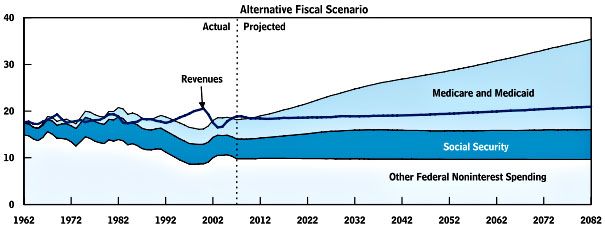The Debt Problems of the European Periphery
By Anders Åslund, Peter Boone and Simon Johnson, The Baseline Scenario
November 17, 2010 at 12:18 am
Last week’s renewed anxiety over bond market collapse in Europe’s periphery should come as no surprise. Greece’s EU/IMF program heaps more public debt onto a nation that is already insolvent, and Ireland is now on the same track. Despite massive fiscal cuts and several years of deep recession Greece and Ireland will accumulate 150% of GNP in debt by 2014. A new road is necessary: The burden of financial failure should be shared with the culprits and not only born by the victims.
The fundamental flaw in these programs is the morally dubious decision to bail out the bank creditors while foisting the burden of adjustment on taxpayers. Especially the Irish government has, for no good reason, nationalized the debts of its failing private banks, passing on the burden to its increasingly poor citizens. On the donor side, German and French taxpayers are angry at the thought of having to pay for the bonanza of Irish banks and their irresponsible creditors.
Such lopsided burden-sharing is rightly angering both donors and recipients. Rising public resentment is testing German and French willingness to promise more taxpayer funds. German Chancellor Angela Merkel’s hasty and ill thought out plan to demand private sector burden sharing, but only “after mid-2013”, marks a first response to these popular demands. We should expect more.
Financial crises are actually not rare, and the rules for their resolution are clear. The fundamental insight is that huge amounts of financial losses, of seemingly real value, need to be distributed across creditors, debtors, equity holders and taxpayers.
My emphasis.
Ireland: How much punishment for British and international banks?
Robert Peston, BBC
09:09 UK time, Wednesday, 17 November 2010
Are haircuts in or out for Ireland? Will the putative experts at the IMF, European Commission and European Central Bank, who will spend the next few days examining Ireland’s intertwined banking and fiscal challenges, recommend that there should be losses imposed on the providers of tens of billions of euros of wholesale debt to banks.
…
It is that phrase “restructuring of the banking sector” which may alarm the banks and financial institutions which are wholesale creditors of Ireland’s banks, the providers of more senior debt which is supposed to be least at risk of non-repayment. The implication is that consideration is being given to forcing losses on them, such that they would share in the costs of rehabilitating Ireland’s banks.
…
(I)t would be a bit odd if the ECB, in the shape of all its senior movers and shakers, were opposed to such haircuts: there is a powerful moral argument, of the sort that normally appeals to central bankers, to the effect that overseas banks and institutions in the UK, Germany and so on should have known better than to encourage Ireland’s banks to lend recklessly and pump up a completely unsustainable property bubble – and that they therefore deserve a bit of a spanking.What’s more, if Ireland is fundamentally incapable of paying off all it owes – which is equivalent to an oppressive 700% of GDP when banking, public sector and private sector debts are added together -some will say it is grotesquely unfair that the cost should fall entirely on taxpayers in Ireland, the European Union and (if IMF money is drawn) the rest of the world.
…
What would then be triggered would be enormous payments by underwriters of credit default swaps (CDSs), the debt insurance contracts taken out by lenders and speculators. These payments would generate enormous losses for the financial institutions, including banks, which provided the CDS cover.
…
Even without the CDS loss multiplier, the impact of debt haircuts would be painful for British and international banks. According to the Bank for International Settlements, total lending of non-Irish banks to Irish banks is around $170bn, of which British banks provided $42bn, German banks provided $46bn, US banks $25bn and French banks $21bn.
…
What’s more, if there are haircuts imposed on Irish bank debt, it’s very difficult to see how haircuts could be avoided for Greek and Portuguese bank debt too, and also for plain vanilla Irish, Portuguese and Greek government borrowings.If you add all that together, it comes to $435bn of exposure for international banks to the banking and public sectors of the eurozone’s three weakest economies. If, say, a third of that were written off (enough to make the residual debt almost bearable) that would trigger not far off $150bn of losses for banks alone.


Recent Comments